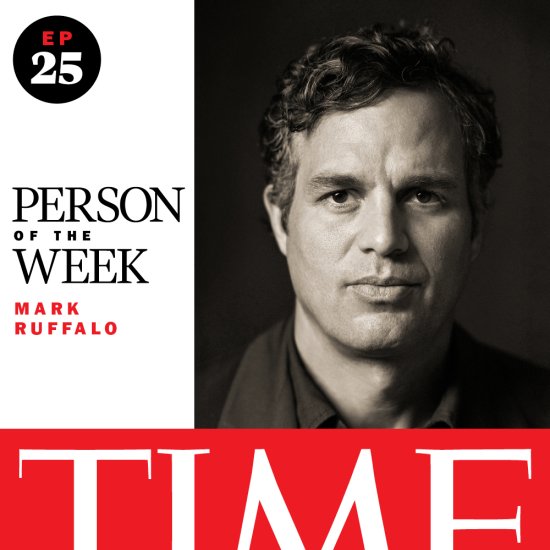
"What Marvel did was take these really complicated characters and put complicated actors, in them, and changed the whole way we looked at studio films."
Mark Ruffalo is one of those rare actors who seems to be everywhere at once, yet still has the vibe of just a totally normal guy off the street. His choices are so sweeping that it makes it hard to categorize his career: he’s done everything from indie films like The Kids are All Right, to procedurals like Spotlight and Zodiac. He’s played the leading man in rom-coms like 13 Going on 30—my personal favorite— and starred as the Hulk in multiple films in the Marvel Cinematic Universe. Over the course of this long and varied career, he’s won two Emmys and has been nominated for three Oscars.
[time-brightcove not-tgx=”true”]Now, he’s playing one of his most adventurous roles yet, starring opposite Emma Stone in Yorgos Lanthimos’s Poor Things, which is shaping up to be a major awards contender. Ruffalo’s role is a departure for him: he plays a manipulative Lothario who is hellbent on taming and controlling Emma Stone’s Frankenstein-esque character.
I loved this conversation because Ruffalo opened up about his long years of struggling to make it as an actor and all the times he almost gave up. He unpacked how he thinks about selecting his projects and what drew him to his most recent role. And he also explained how he learned to use his celebrity to advance the causes he cares about most.
Tune in every Thursday, and join us as we continue to explore the minds that shape our world. You can listen to the full episode in the player above, but here are a handful of excerpts from our conversation, which have been condensed and edited for clarity.
On how he almost quit acting, until his mother set him straight:
I had to go to my brother for the umpteenth time, my younger brother, who was a really successful hairdresser. And I was like, ‘Scotty, I’m in a bind.’ And he’s like, ‘What is it now?’ And I was like, ‘Ehh, my car.’ And he’s like, ‘Hey, you know, maybe it’s time you really start thinking about getting serious and maybe think of a different career. You know, it’s obviously not really happening.’ So, that was probably the real quitting time. And I called my dad and I said ‘Listen, I’m going to come join the family business.’
And my mom caught wind of this. And she called me and she said, ‘What are you doing? I was like, I don’t know mom. I don’t know if it’s working out.’ She’s like, ‘You get back to Los Angeles or I will never speak to you again.’
Now my mom, I mean, I’d never heard her like this. And it, it just, it chilled up my spine. And I was also like: Thank God.
On how Marvel transformed the movie industry:
It’s really interesting, I mean, it really goes back to Robert Downey Jr. He was our golden star. I mean, he was the great indie actor who came from this theater background. And was dynamic and naughty and [had] all of these qualities that as a young actor you admired in him. And then Marvel and Jon Favreau had this crazy idea that they would put him in a tentpole studio movie.
[Before then] they would never bring an actor like him into that role. It had to be a vetted studio guy. And there was a difference then, you know? You were either an indie actor or you were a studio actor. And he was not a studio actor. And he also had a complicated life.
And he crossed over. And it was at the same time that indie movies were starting to transition into mainstream. And Marvel’s, I mean, this is genius of them. They’re like, ‘Why don’t we use those character-driven stories with indie actors? And put them in a studio tentpole movie?’
And that was a radical shift. And they took a gamble. What Marvel did was take these really complicated characters and put complicated actors in them, and changed the whole way we looked at studio films. They made this hybrid. And that was how they changed the whole studio system.
And, you know, like everything, it grows and it grows and it grows and it reaches a point where it’s, you know, too big to fail almost. People saw that model and they just want to duplicate it.
And they want to take old IP and they want to revive it and rebrand it. And they want to know that whatever investments they make are going to translate immediately to people’s sentimentality to the past. And that’s become a whole business model now.
On why he decided to play a “Lothario in Poor Things:
This movie totally flew in the face of any other part I played.
Comedy at that level, raunchiness—although I’ve done some raunchy stuff in the past—working with that kind of director in this kind of a film, with an ensemble like that. I’ve worked with great actors and great ensembles, but this has another shift to it. And it pushed me way outside my comfort zone to the point where I tried to talk Yorgos out of giving me the part.
I was so scared of it. And I was also like bought into that thing. Like: this isn’t really what people would expect from me. And do I want to be seen like this guy?
And like deadly, deadly, deadly things to a creative person. When you start letting that lead you. That self-doubt or that idea that ‘I have to stay in my box.’ Or ‘this is what I do.’ This is what people expect. And you gotta fight against it. And, and each time you fight, it’s that much harder because you’re that much more cemented into it, you know?